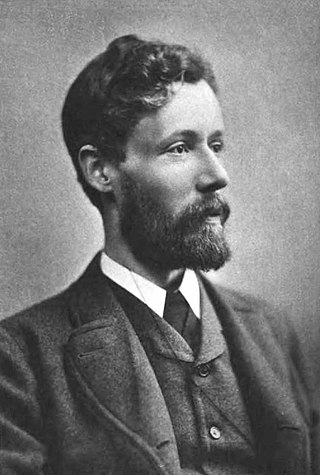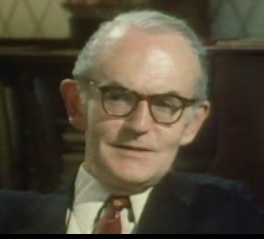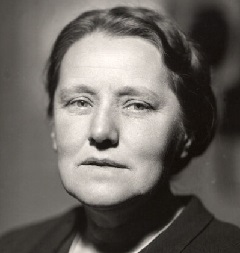
David George Ritchie was a Scottish philosopher who had a distinguished university career at Edinburgh, and Balliol College, Oxford, and after being fellow of Jesus College and a tutor at Balliol College was elected professor of logic and metaphysics at St Andrews. He was also the third president of the Aristotelian Society in 1898.

John Langshaw Austin, OBE, FBA was a British philosopher of language and leading proponent of ordinary language philosophy, best known for developing the theory of speech acts.

John Leslie Mackie was an Australian philosopher. He made significant contributions to ethics, the philosophy of religion, metaphysics, and the philosophy of language.
Gertrude Elizabeth Margaret Anscombe, usually cited as G. E. M. Anscombe or Elizabeth Anscombe, was a British analytic philosopher. She wrote on the philosophy of mind, philosophy of action, philosophical logic, philosophy of language, and ethics. She was a prominent figure of analytical Thomism, a Fellow of Somerville College, Oxford, and a professor of philosophy at the University of Cambridge.

Alfred Cyril EwingFBA, was an English philosopher who spent most of his career at the University of Cambridge. He was a prolific writer who made contributions to Kant scholarship, metaphysics, epistemology, ethics, and the philosophy of religion.

Charlie Dunbar Broad, usually cited as C. D. Broad, was an English epistemologist, historian of philosophy, philosopher of science, moral philosopher, and writer on the philosophical aspects of psychical research. He was known for his thorough and dispassionate examinations of arguments in such works as Scientific Thought (1923), The Mind and Its Place in Nature (1925), and Examination of McTaggart's Philosophy.

Mary Beatrice Midgley was a British philosopher. A senior lecturer in philosophy at Newcastle University, she was known for her work on science, ethics and animal rights. She wrote her first book, Beast and Man (1978), when she was in her late fifties, and went on to write over 15 more, including Animals and Why They Matter (1983), Wickedness (1984), The Ethical Primate (1994), Evolution as a Religion (1985), and Science as Salvation (1992). She was awarded honorary doctorates by Durham and Newcastle universities. Her autobiography, The Owl of Minerva, was published in 2005.

Helen Mary Warnock, Baroness Warnock, was an English philosopher of morality, education, and mind, and a writer on existentialism. She is best known for chairing an inquiry whose report formed the basis of the Human Fertilisation and Embryology Act 1990. She served as Mistress of Girton College, Cambridge from 1984 to 1991.
Evolutionary ethics is a field of inquiry that explores how evolutionary theory might bear on our understanding of ethics or morality. The range of issues investigated by evolutionary ethics is quite broad. Supporters of evolutionary ethics have claimed that it has important implications in the fields of descriptive ethics, normative ethics, and metaethics.

Sir Geoffrey James Warnock was an English philosopher and Vice-Chancellor of Oxford University. Before his knighthood, he was commonly known as G. J. Warnock.

Paul Samuel Reinsch, was an American political scientist and diplomat. He played an influential role in developing the field of international relations. He helped form the American Political Science Association and the American Society of International Law.

Lizzie Susan Stebbing was a British philosopher. She belonged to the 1930s generation of analytic philosophy, and was a founder in 1933 of the journal Analysis. Stebbing was the first woman to hold a philosophy chair in the United Kingdom, as well as the first female President of Humanists UK.

Principia Ethica is a book written in 1903 by British philosopher, G. E. Moore. Moore questions a fundamental pillar of ethics, specifically what the definition of "good" is. He concludes that "good" is indefinable because any attempts to do so commit the naturalistic fallacy. Principia Ethica was influential, with Moore's arguments being considered ground-breaking advances in the field of moral philosophy.
Women have made significant contributions to philosophy throughout the history of the discipline. Ancient examples include Maitreyi, Gargi Vachaknavi, Hipparchia of Maroneia and Arete of Cyrene. Some women philosophers were accepted during the medieval and modern eras, but none became part of the Western canon until the 20th and 21st century, when some sources indicate that Susanne Langer, G.E.M. Anscombe, Hannah Arendt and Simone de Beauvoir entered the canon.

James Opie Urmson was a philosopher and classicist who spent most of his professional career at Corpus Christi College, Oxford. He was a prolific author and expert on a number of topics including British analytic/linguistic philosophy, George Berkeley, ethics, and Greek philosophy.
Tzachi Zamir is an Israeli philosopher and literary critic specialising in the philosophy of literature, the philosophy of theatre, and animal ethics. He is Professor of English and General & Comparative Literature at the Hebrew University of Jerusalem.

Alan Richard White was an analytic philosopher who worked mainly in epistemology, the philosophy of mind, and, latterly, legal philosophy. Peter Hacker notes that he was "the most skillful developer of Rylean ... ideas in philosophical psychology" and that "if anyone surpassed Austin in subtlety and refinement in the discrimination of grammatical differences, it was White." Richard Swinburne remarks that "during the heyday of 'ordinary language philosophy' no tongue practised it better."
Paul Christopher Taylor is an American philosopher, author, and was W. Alton Jones Professor of Philosophy at Vanderbilt University until moving to UCLA in the summer of 2023. Previously he taught philosophy and African American studies at Pennsylvania State University. He writes on race theory, aesthetics, pragmatism, social and political philosophy, and Africana philosophy.
Dutch philosophy is a broad branch of philosophy that discusses the contributions of Dutch philosophers to the discourse of Western philosophy and Renaissance philosophy. The philosophy, as its own entity, arose in the 16th and 17th centuries through the philosophical studies of Desiderius Erasmus and Baruch Spinoza. The adoption of the humanistic perspective by Erasmus, despite his Christian background, and rational but theocentric perspective expounded by Spinoza, supported each of these philosopher's works. In general, the philosophy revolved around acknowledging the reality of human self-determination and rational thought rather than focusing on traditional ideals of fatalism and virtue raised in Christianity. The roots of philosophical frameworks like the mind-body dualism and monism debate can also be traced to Dutch philosophy, which is attributed to 17th century philosopher René Descartes. Descartes was both a mathematician and philosopher during the Dutch Golden Age, despite being from the Kingdom of France. Modern Dutch philosophers like D.H. Th. Vollenhoven provided critical analyses on the dichotomy between dualism and monism.

Joanne Bridgett Ciulla is an American philosopher. She is a pioneer in the field of leadership ethics as well as teaching and publishing on business Ethics. She is currently a professor at the Rutgers Business School - Newark and New Brunswick and is the director of the Institute for Ethical Leadership. She has received several awards for her contributions to leadership studies and business ethics.














